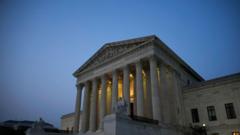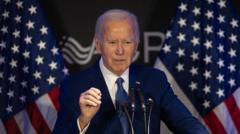The US Supreme Court is deliberating President Trump's executive order aimed at ending birthright citizenship, a move that could have profound implications for immigration in the US, amid ongoing legal battles and injunctions from lower courts.
Supreme Court Weighs Trump's Challenge to Birthright Citizenship

Supreme Court Weighs Trump's Challenge to Birthright Citizenship
Landmark hearings could reshape immigration policies as the Supreme Court examines executive power.
The US Supreme Court is currently engaged in a pivotal hearing regarding President Trump’s executive order to terminate birthright citizenship, which has significant implications for immigration policy in the country. The argument, presented on Thursday, focuses on whether lower court judges can implement nationwide injunctions against presidential mandates. Upon returning to the White House in January, Trump quickly signed an order stating that children born in the US to undocumented immigrants would no longer be granted citizenship. This directive was halted by three federal judges, emphasizing a consistent pattern of judicial opposition to Trump's executive actions.
Trump argues that the lower courts have overstepped their authority by issuing nationwide stays against his order. If the Supreme Court decides in favor of Trump, it could empower him to utilize executive orders more extensively, bypassing Congress, and enforcing his immigration agenda with fewer judicial constraints.The Court’s exceptional session in May raises questions, with no indications on when a ruling will be announced. Notably, Trump appointed three justices to the conservative-majority Court during his first term, prompting speculation about the case's outcome.
Legal experts largely contend that the termination of birthright citizenship is unconstitutional, secured under the 14th Amendment, which states that "all persons born or naturalised in the United States, and subject to the jurisdiction thereof, are citizens." Trump's interpretation that this does not apply to children of undocumented immigrants introduces a contentious debate. Although the current case involves various lawsuits, both from immigrant advocates and multiple US states, the Trump administration seeks clarification on the power of lower courts to apply universal injunctions.
Reports indicate nearly 40 injunctions have been filed against Trump’s policies since his second term began. A precedent is seen in another case, where the Supreme Court intervened to allow the administration to enforce a military transgender ban previously blocked by lower courts. If birthright citizenship is abolished, it could lead to significant consequences for thousands of children, many of whom might face the risk of becoming undocumented or even stateless. Experts warn that deporting these individuals would pose additional challenges given the complexities surrounding their parentage.





















